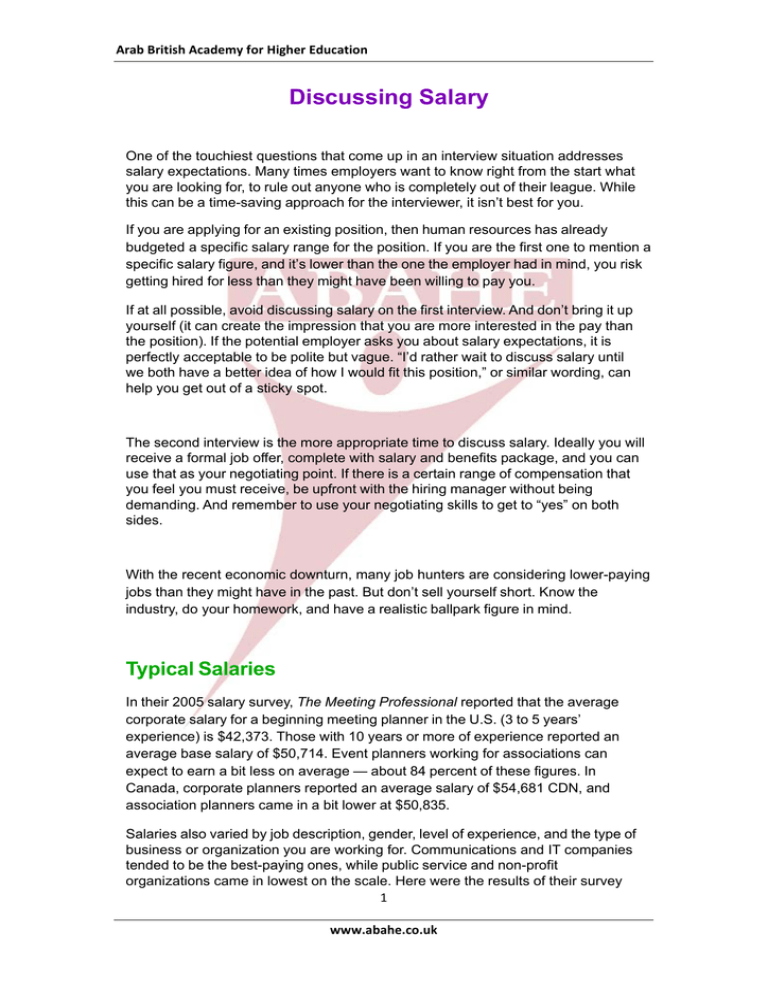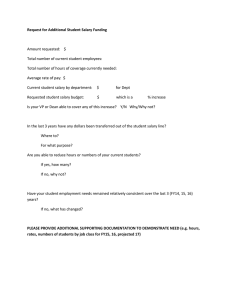
Arab British Academy for Higher Education Discussing Salary
One of the touchiest questions that come up in an interview situation addresses
salary expectations. Many times employers want to know right from the start what
you are looking for, to rule out anyone who is completely out of their league. While
this can be a time-saving approach for the interviewer, it isn’t best for you.
If you are applying for an existing position, then human resources has already
budgeted a specific salary range for the position. If you are the first one to mention a
specific salary figure, and it’s lower than the one the employer had in mind, you risk
getting hired for less than they might have been willing to pay you.
If at all possible, avoid discussing salary on the first interview. And don’t bring it up
yourself (it can create the impression that you are more interested in the pay than
the position). If the potential employer asks you about salary expectations, it is
perfectly acceptable to be polite but vague. “I’d rather wait to discuss salary until
we both have a better idea of how I would fit this position,” or similar wording, can
help you get out of a sticky spot.
The second interview is the more appropriate time to discuss salary. Ideally you will
receive a formal job offer, complete with salary and benefits package, and you can
use that as your negotiating point. If there is a certain range of compensation that
you feel you must receive, be upfront with the hiring manager without being
demanding. And remember to use your negotiating skills to get to “yes” on both
sides.
With the recent economic downturn, many job hunters are considering lower-paying
jobs than they might have in the past. But don’t sell yourself short. Know the
industry, do your homework, and have a realistic ballpark figure in mind.
Typical Salaries
In their 2005 salary survey, The Meeting Professional reported that the average
corporate salary for a beginning meeting planner in the U.S. (3 to 5 years’
experience) is $42,373. Those with 10 years or more of experience reported an
average base salary of $50,714. Event planners working for associations can
expect to earn a bit less on average — about 84 percent of these figures. In
Canada, corporate planners reported an average salary of $54,681 CDN, and
association planners came in a bit lower at $50,835.
Salaries also varied by job description, gender, level of experience, and the type of
business or organization you are working for. Communications and IT companies
tended to be the best-paying ones, while public service and non-profit
organizations came in lowest on the scale. Here were the results of their survey
1 www.abahe.co.uk Arab British Academy for Higher Education broken down by job
title, based on 2004 total annual compensation:
Rate Job Title $68,840 $57,513 $49,429 $46,703 $45,677 Director Senior Meeting Planner Project Manager Meeting Planner Coordinator
SOURCE:
“Money Matters,” by Dawn Myers, The Meeting
Professional, September 2005
Use these numbers as a guideline when considering your salary expectations, and
be realistic about regional differences and the current economic climate. An
excellent source for regional salary information is Salary.com. This site offers
industry figures from all over the United States and includes other free information
as well.
Salary.com http://www.salary.com
While effective negotiations can lead to a higher salary, if you really want an
unlimited potential for income, then you should consider being self-employed.
All Rights Reserved © Arab British Academy for Higher Education 2 www.abahe.co.uk




